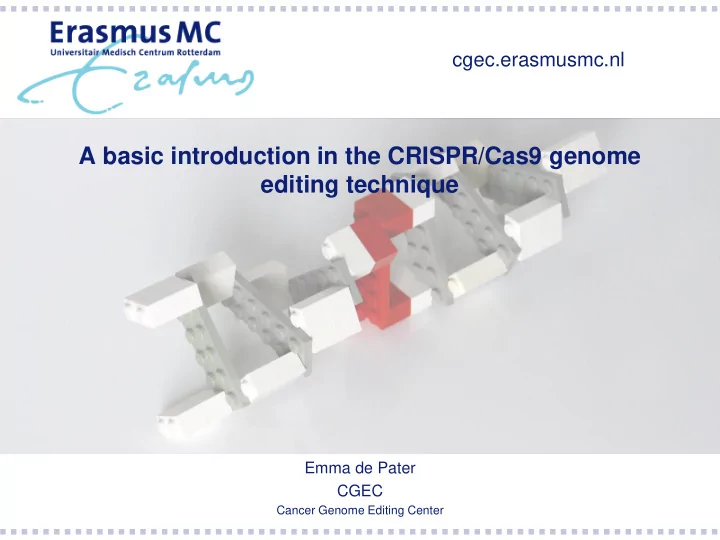

cgec.erasmusmc.nl A basic introduction in the CRISPR/Cas9 genome editing technique Emma de Pater CGEC Cancer Genome Editing Center
CRISPR/Cas9 CRISPR/Cas9 – The immune system of bacteria CRISPR/Cas9 – as a biomedical tool What to think of when you design your experiment Cas9 Variants CRISPR in the lab 2
R R R S1 S2 S3 Clustered Regularly Interspaced Short Palindromic Repeats 3
R R R S1 S2 S3 tracrRNA crRNA 4
Cas9 5
Cas9 6
CRISPR/Cas9 CRISPR/Cas9 – The immune system of bacteria CRISPR/Cas9 – as a biomedical tool What to think of when you design your experiment Cas9 Variants CRISPR in the lab 7
CRISPR/Cas9 as a tool for biomedical research 8
Genome editing options for CRISPR/Cas9 Generation of: Mutations (large) deletions Integrations (reporters, tags) Activation/repression of transcription DNA Delete Gene function Introduce new gene/sequence 9
Non homologous end joining (NHEJ) 10
Homology directed repair (HDR) 11
What to think of when you design your experiment Cas9 delivery Off target effects Repairable cell Editing efficiency
Generating a patiënt specific mutation DNA Delete Gene function Introduce new gene/sequence * * Puro LoxP LoxP 13
Off target effects 14
CRISPR/Cas9 CRISPR/Cas9 – The immune system of bacteria CRISPR/Cas9 – as a biomedical tool What to think of when you design your experiment Cas9 Variants CRISPR in the lab 15
How to make CRISPR/Cas9 more specific? 16
Kleinstiver, Nature, 2016 (HF-Cas9) Slaymaker, Science, 2015 (eSpCas9) 17
Base editing Komor et al., Nature, 2016 (Cytidine deaminase) C>T Gaudelli et al., Nature in press (deoxyadenosine deaminase) A > G 18
How to deal with off-target effects Check your clone with NGS Redesign your guide HF or eCas9 Nickase Cas9 Use multiple clones or multiple guides Use a hit and run method (ribonuclearprotein transfection) Backcross your mouse line When Cas9 is loaded, fewer off-targets! 19
Modification of gene expression Activation (CRISPRa) Repression (CRISPRi) 20
How it works in the lab Visit cgec.erasmusmc.nl for a detailed protocol Make sure your target sequence is what you think www.ensembl.org (and sequence verify) Design your guide (GG-18N-NGG) crispr.mit.edu/ chopchop.rc.fas.harvard.edu/ Clone your guide into proper Cas9 expression vector Transfect your cells Cas9 is large, make sure you get ~90% efficiency with a GFP control vector Pick and screen clones by PCR/sequence verification 21
22
Recommend
More recommend